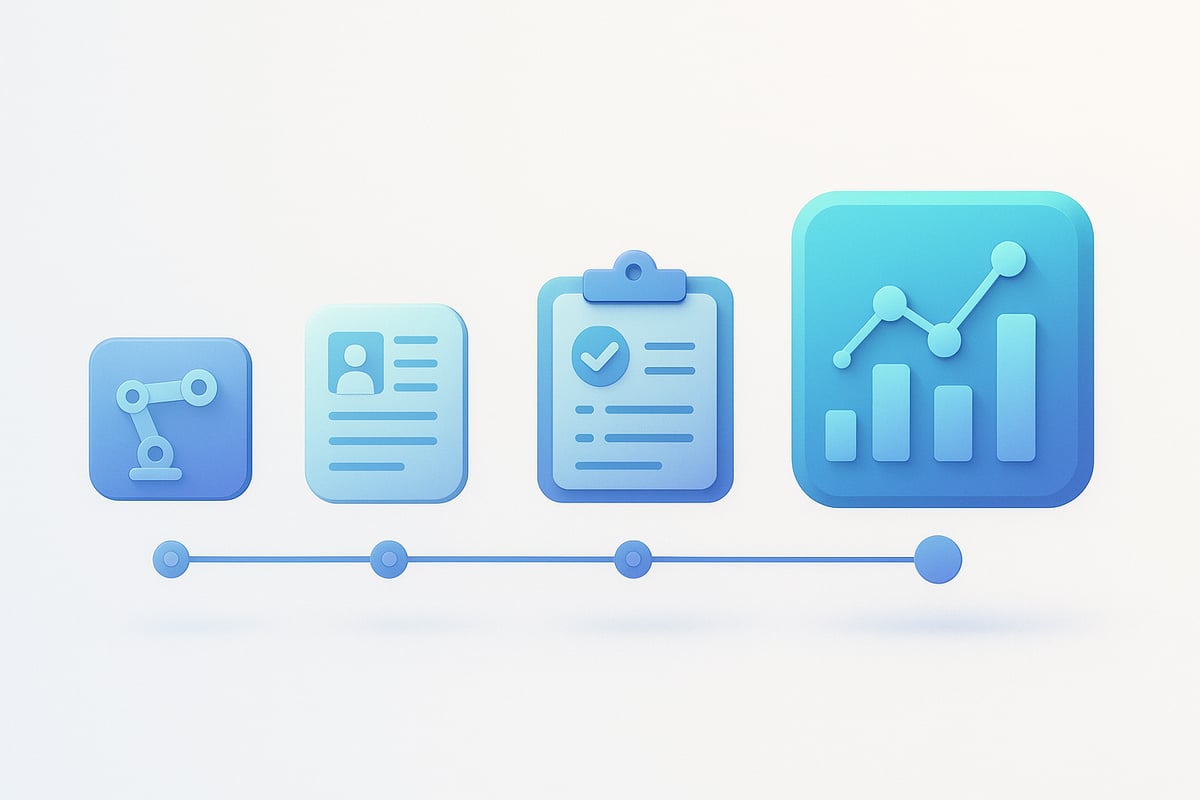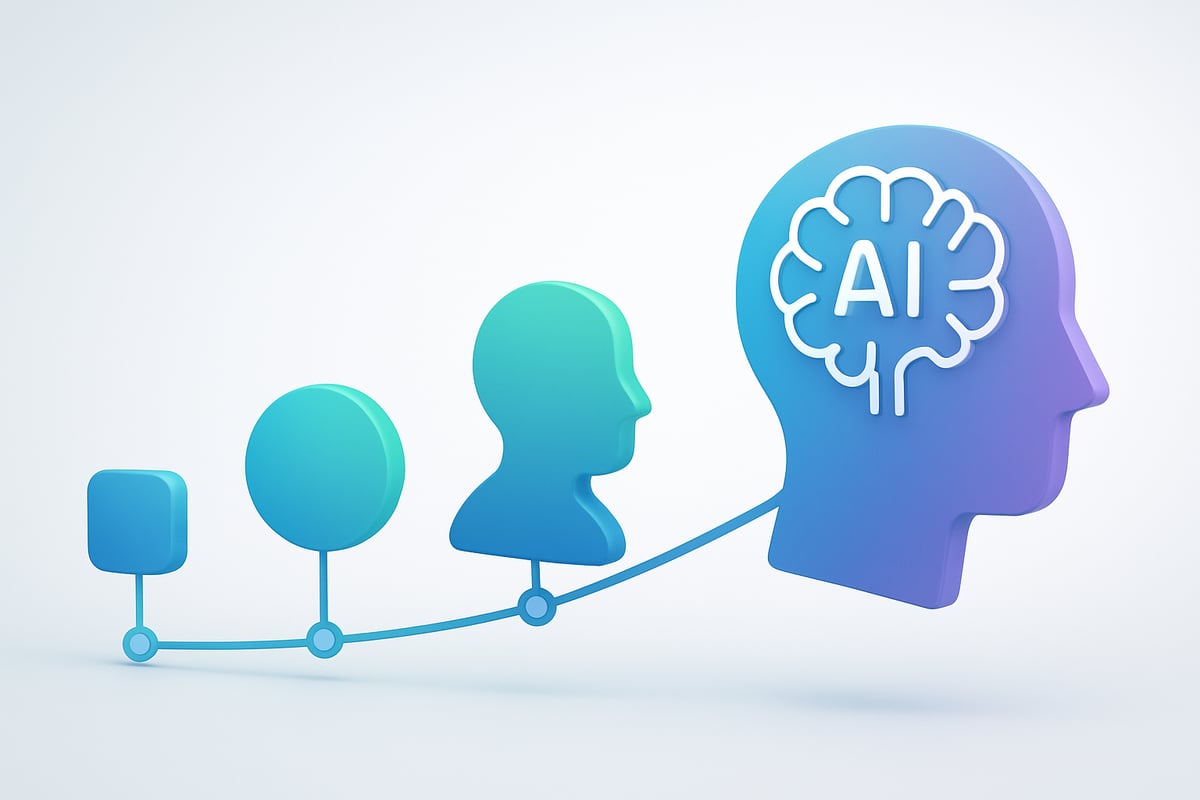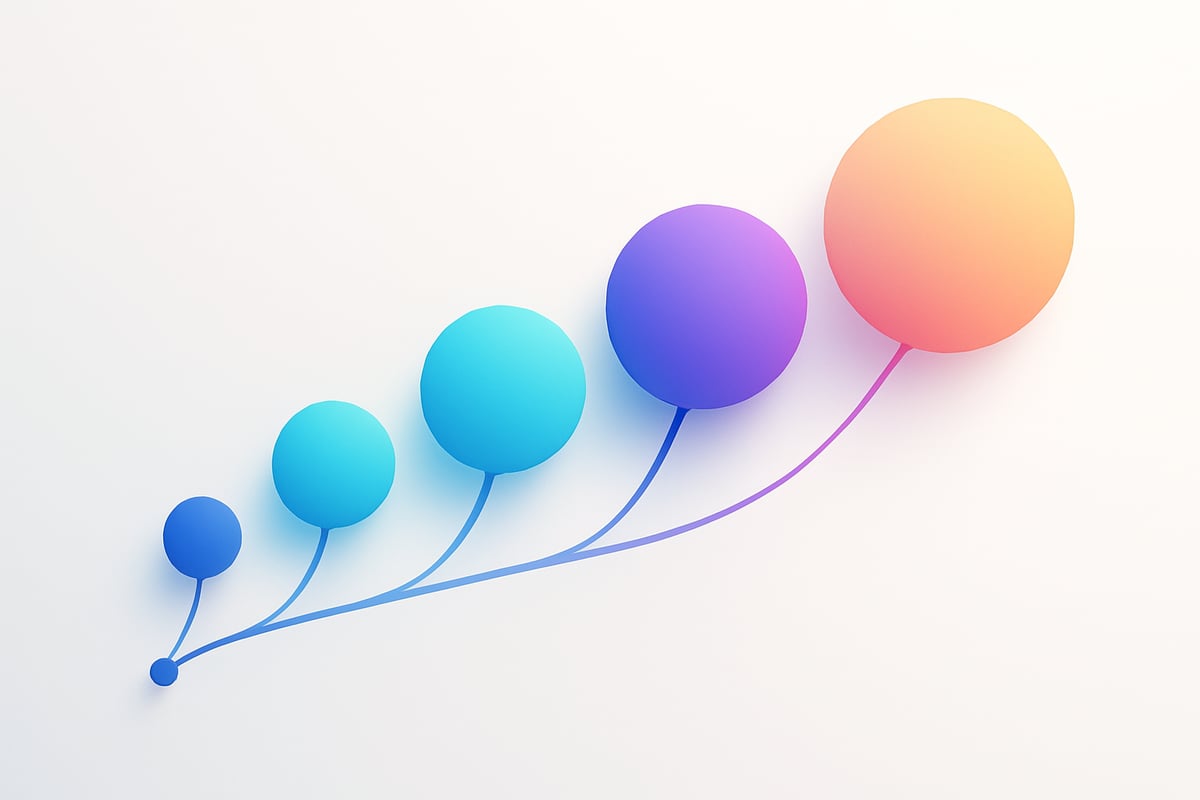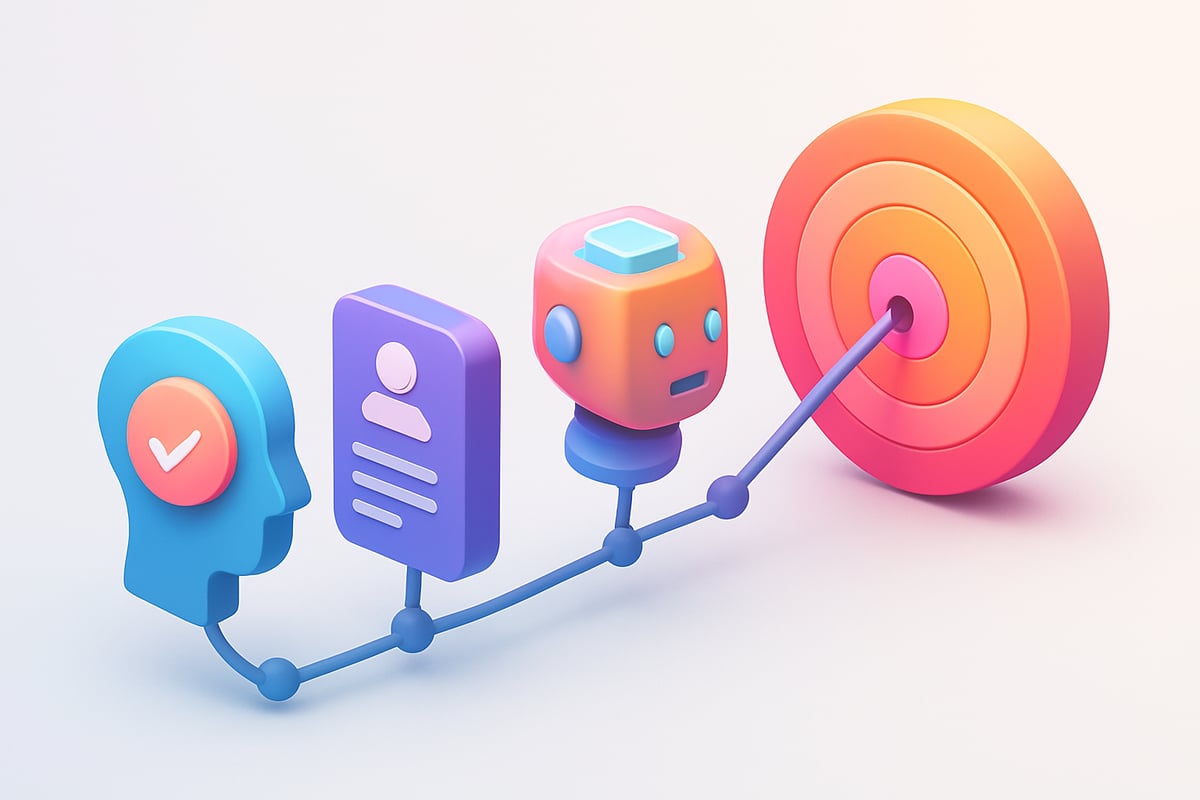October 22, 2025
The Essential Guide to AI in Hiring Process for 2025

AI is transforming recruitment at a pace never seen before, reshaping how companies find and select talent. As the ai in hiring process becomes more advanced, organizations can achieve greater efficiency and fairness in their hiring decisions.
This guide empowers HR professionals, recruiters, and business leaders to confidently navigate the evolving world of AI-powered hiring in 2025. You will gain a comprehensive, actionable understanding of trends, benefits, challenges, and proven best practices.
Explore the latest AI applications, integration steps, ethical considerations, candidate experience improvements, compliance essentials, future trends, and practical recommendations. Equip your organization to hire smarter and more fairly in 2025.
The Evolution of AI in the Hiring Process
The journey of AI in hiring process began with basic automation tools that aimed to lighten recruiters’ administrative burdens. In the early 2000s, organizations experimented with resume keyword scanning and automated email responses. These initial steps set the stage for more sophisticated developments, as HR leaders sought to streamline repetitive, time-consuming tasks and improve candidate matching.
As technology advanced, the introduction of AI-driven CV parsing represented a pivotal milestone. These systems allowed recruiters to sift through thousands of applications in minutes, significantly accelerating the screening phase. Automated shortlisting soon followed, using algorithms to rank candidates by relevance to job criteria. Interview intelligence platforms emerged, leveraging natural language processing and machine learning to assess candidate responses and predict job fit.
The transformation from manual processes to data-driven workflows has been profound. Recruiters once relied on intuition and manual sorting, but the modern ai in hiring process uses predictive analytics and large datasets to make informed decisions. Machine learning models can now learn from historical hiring data, identifying patterns that humans might miss. Natural language processing enables systems to interpret complex CVs, cover letters, and even interview transcripts, extracting meaningful insights.
Leading companies like Unilever and Hilton have embraced these advancements, leveraging AI-powered platforms to reduce screening time by up to 92%. According to recent industry reports, organizations using AI saw measurable improvements in both efficiency and hiring quality. For a deeper dive into how these technologies are applied throughout recruitment, see AI in recruitment process explained.
The global shift to remote work during the pandemic further accelerated AI adoption in HR technology. Organizations needed tools that could manage virtual hiring at scale, prompting rapid investment in digital recruitment solutions. As a result, the ai in hiring process became not only a competitive advantage but a necessity for operational resilience.
Today, there is a growing demand for HR professionals and recruiters who understand the ai in hiring process and can work alongside intelligent systems. In 2025, capability in AI-driven recruitment will be a core skill, as companies seek to maximize both efficiency and fairness in talent acquisition. The evolution continues, with each innovation laying the groundwork for smarter, more ethical, and more inclusive hiring practices.

Step-by-Step: Integrating AI into Your Hiring Workflow
Implementing ai in hiring process is a transformative journey, offering organizations the chance to radically improve efficiency, accuracy, and fairness. As the talent landscape evolves in 2025, a structured approach ensures that every step delivers measurable value.

Embarking on ai in hiring process integration starts by evaluating where your current hiring workflow stands. Map out each stage from job posting to onboarding. Identify bottlenecks, such as lengthy screening times or inconsistent candidate evaluations. Engage with recruiters, hiring managers, and HR teams to gather insights on pain points and manual tasks that slow down decision-making. This diagnostic phase helps clarify the specific challenges AI is best positioned to solve.
Next, select AI tools that align with your organization’s needs and scale. Consider the size of your company, hiring volume, and the complexity of roles you recruit for. Some firms require robust, fully integrated platforms, while others might benefit from modular solutions that address particular gaps. Define your objectives early. Are you aiming to reduce time-to-hire, increase diversity, or improve candidate quality? These goals will guide your technology choices and set benchmarks for measuring AI’s success. For a practical guide on tool selection and best practices, you can explore How to use AI in recruiting.
Once you have chosen the right solutions, focus on seamless onboarding and integration into existing systems like your ATS or recruitment CRM. Data migration is a critical step—ensure your candidate information is clean, well-structured, and compatible with AI models. Schedule training sessions for all stakeholders, from recruiters to hiring managers, so they understand how ai in hiring process enhances their work. Provide clear documentation, demonstrations, and support channels to build user confidence.
Continuous monitoring is essential to ensure the ai in hiring process remains accurate and fair. Regularly review AI-generated recommendations, candidate rankings, and shortlists for consistency and bias. Establish feedback loops that allow users to flag anomalies or suggest improvements. As your organization grows or your hiring needs shift, revisit your AI models and retrain them with new data to maintain relevance and performance.
Consider a real-world example: A global technology company integrated AI-powered CV screening and automated shortlisting into its workflow. Within six months, they achieved a 97 percent match accuracy for technical roles and cut screening times by 92 percent. The ai in hiring process not only improved efficiency but also increased diversity in their talent pool by identifying qualified candidates who might have been overlooked by traditional methods.
Adoption is not without challenges. Change management and user skepticism are common hurdles. To address these, communicate the benefits and limitations of AI transparently. Involve end-users early, gather feedback, and adjust implementation plans to address concerns. Encourage a culture that values both data-driven insights and human judgment.
By following these steps, organizations can unlock the full potential of ai in hiring process. Focus on clarity, collaboration, and continuous improvement to ensure that your journey toward smarter, fairer hiring delivers lasting impact.
Addressing AI Bias and Ensuring Ethical Hiring
Artificial intelligence has rapidly transformed the recruitment landscape, but the integration of ai in hiring process brings with it complex questions of fairness and ethics. As organizations rely more on automation to evaluate candidates, the risk of perpetuating or even amplifying bias grows. Recognizing and addressing these challenges is critical for building diverse, inclusive, and equitable workplaces.

Understanding AI Bias in Recruitment
Bias in the ai in hiring process arises when algorithms inadvertently favor or disadvantage certain groups. This often stems from historical data that reflect existing societal inequalities. For example, if an AI model is trained on resumes from a workforce that lacks diversity, it may learn to prefer candidates with similar backgrounds, reinforcing existing patterns.
Algorithmic opacity is another concern. Many AI systems operate as black boxes, making it difficult to trace how decisions are made. Without transparency, it becomes challenging for organizations to identify and correct biased outcomes.
The Ethical Implications of AI-Driven Hiring
Relying on the ai in hiring process for critical decision-making raises important ethical questions. Automated screening and ranking can influence who gets interviewed, which in turn shapes the makeup of entire organizations. If unchecked, these systems may exclude qualified candidates based on race, gender, age, or other protected characteristics.
Industry experts have called for ethical frameworks that prioritize fairness, transparency, and accountability in AI deployment. These frameworks recommend regular reviews of AI models, clear documentation of decision criteria, and mechanisms for candidates to appeal or request feedback.
Strategies to Mitigate Bias in AI Hiring
There are several proactive steps organizations can take to minimize bias in the ai in hiring process. Regular audits of AI tools, using diverse and representative training data, and ensuring transparency in algorithmic logic are essential. Many companies now collaborate with third-party experts to evaluate and certify their AI models for fairness.
Human oversight remains a cornerstone of ethical hiring. By combining AI recommendations with recruiter judgment, organizations reduce the likelihood of unfair outcomes. Transparent communication with candidates about how AI is used also builds trust and accountability.
To deepen your understanding of how technology can support fairness, explore Reducing bias with AI hiring tools, which details practical approaches for organizations striving for bias-free recruitment.
Real-World Impact and Legal Considerations
Several high-profile companies have faced scrutiny over biased outcomes in the ai in hiring process. In some cases, organizations paused or revised their AI strategies after discovering unintended discrimination. Recent studies have shown that even small biases in algorithms can significantly impact hiring outcomes, especially when applied at scale.
Regulatory standards for AI in recruitment are evolving rapidly. In 2025, compliance with frameworks such as the EU AI Act, GDPR, and EEOC guidelines is non-negotiable. Employers must maintain detailed audit trails, obtain informed consent, and ensure candidates’ data privacy at every stage.
By prioritizing ethical principles and continuous oversight, organizations can harness the benefits of the ai in hiring process while promoting fairness, diversity, and legal compliance. The journey toward ethical AI is ongoing, but with deliberate action and transparency, the future of recruitment can be both innovative and just.
Enhancing Candidate Experience with AI
The ai in hiring process is transforming the candidate journey in 2025, setting new standards for efficiency and fairness. Today’s applicants expect more than just a streamlined application — they seek clarity, speed, and personalized engagement at every stage. By leveraging advanced tools, organizations can now deliver a hiring experience that is both responsive and transparent, driving higher satisfaction and trust among job seekers.
Modern recruitment platforms use the ai in hiring process to provide personalized communication from the moment a candidate applies. Automated chatbots offer 24/7 support, answering questions instantly and guiding applicants through each step. These AI-driven touchpoints ensure candidates never feel left in the dark, while instant feedback mechanisms allow them to track their progress and understand next steps without unnecessary delays.
AI-powered video interviews and automated scheduling tools further enhance the ai in hiring process by offering unmatched convenience. Candidates can record responses or join virtual interviews at times that suit their schedules, reducing logistical barriers and stress. This flexibility demonstrates respect for candidates’ time and can be especially valuable in global or remote hiring scenarios, where traditional interviews might be difficult to coordinate.
A key advantage of the ai in hiring process is its ability to deliver consistent, unbiased evaluations. AI algorithms apply the same criteria to every applicant, minimizing the risk of unconscious bias and promoting a sense of fairness. According to recent industry surveys, candidates report higher satisfaction when they perceive the process as objective and transparent. For a deeper dive into these trends, see AI's Influence on Candidate Experience.
While automation brings many benefits, some candidates worry about losing the human touch. Leading organizations address this by blending AI automation with empathetic, personalized outreach from recruiters. Thoughtful messaging, transparent explanations of AI’s role, and opportunities for live interaction help ensure the ai in hiring process remains both efficient and genuinely engaging. In 2025, the organizations achieving the best candidate experiences are those that use AI to enhance, not replace, the human element in hiring.

Compliance, Data Security, and Legal Considerations in 2025
The regulatory landscape for ai in hiring process is evolving rapidly as organizations embrace new technologies. In 2025, HR teams must navigate complex frameworks such as GDPR, EEOC guidelines, and a growing list of international standards. Each regulation is designed to safeguard candidate data, ensure fairness, and mandate transparency in the use of AI for hiring decisions.
Organizations must prioritize data privacy and obtain explicit consent from candidates before collecting or analyzing personal information through ai in hiring process. Secure storage of applicant data is non-negotiable, with encryption and access controls now standard practice. Many countries require employers to provide clear disclosures about how AI tools are used, what data is collected, and the intended outcomes, making transparency a cornerstone of compliance.
Legal responsibilities extend beyond simple adherence to privacy laws. Employers are accountable for decisions made by ai in hiring process, whether those decisions are automated or guided by algorithms. Maintaining detailed audit trails and robust reporting mechanisms is essential for verifying compliance, especially during regulatory reviews or in response to candidate inquiries. Regular audits help organizations detect and correct any unintended biases or errors in AI models, reducing risk and promoting fairness.
Vendor due diligence has also become a critical step in the ai in hiring process. Companies must assess the legal standing and security protocols of third-party AI providers, ensuring all contractual agreements include data protection clauses and rights to audit. Failure to meet compliance standards can result in significant penalties or reputational damage, as seen in recent cases where organizations faced legal action over inadequate candidate consent or data breaches. According to the AI Adoption in Hiring Practices, regulatory scrutiny is expected to intensify as AI becomes more central to recruitment workflows.
Staying up to date with the latest regulations and best practices is crucial for any organization using ai in hiring process. Industry bodies, legal advisors, and reputable HR tech sources provide guidance on emerging compliance challenges. As the intersection of technology and law continues to evolve, proactive risk management and ongoing education will empower HR professionals to hire smarter while protecting both candidates and their organizations.
Future Trends: What’s Next for AI in Hiring?
The next wave of transformation in the ai in hiring process is unfolding rapidly, promising to reshape how organizations identify, assess, and onboard talent in 2025 and beyond. As innovation accelerates, forward-thinking companies are preparing for a future where AI is not just an assistant but a strategic partner in recruitment. What key shifts and technologies will define this era?
Generative AI is poised to become a cornerstone of the ai in hiring process. In the coming years, expect to see advanced models that not only match candidates to roles but also generate tailored skills assessments and simulate dynamic interview scenarios. These tools will enable recruiters to evaluate both hard and soft skills with unprecedented accuracy, offering deep insights into candidate potential. Video analysis, natural language processing, and sentiment detection will further enhance the ability to predict cultural fit, making hiring more holistic.
Integration between AI-driven recruitment platforms and broader HR technologies will intensify. Seamless data flow from sourcing to onboarding will support hyper-personalized candidate experiences. AI will automate schedule coordination, deliver real-time feedback, and provide continuous engagement, ensuring every applicant feels valued. Predictive workforce planning will leverage historical and real-time data to forecast talent needs, helping organizations stay agile. As the Benefits of AI in recruitment continue to expand, companies will see measurable gains in efficiency and quality of hire.
With these advancements, the ethical and regulatory landscape for the ai in hiring process will become more complex. There will be heightened scrutiny on how algorithms make decisions, driving a push for transparency, explainability, and regular bias audits. New global standards will emerge, requiring organizations to demonstrate fairness and compliance at every stage. According to AI's Role in Reducing Hiring Bias, companies are already investing in tools to monitor and mitigate bias, setting the stage for more equitable hiring practices.
Looking ahead, industry experts predict widespread adoption of AI-powered recruitment tools across markets. The ai in hiring process will increasingly focus on dynamic, multi-dimensional candidate profiles, integrating skills, values, and potential for growth. Organizations are encouraged to invest in upskilling HR teams, establish clear ethical guidelines, and partner with trusted vendors. By embracing innovation and maintaining a human-centered approach, companies can future-proof their strategies and make smarter, fairer hiring decisions in 2025 and beyond.
